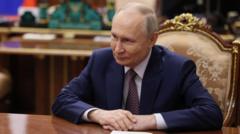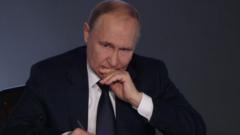A Russian court has sentenced three lawyers representing the late opposition leader Aleksei Navalny to prison terms, reinforcing a climate of political repression. The sentences of up to 5.5 years have drawn condemnation from Navalny's widow and supporters, who view the rulings as an extension of the Kremlin's vendetta against those associated with Navalny.
Russian Court Sentences Navalny's Lawyers Amid Ongoing Political Repression

Russian Court Sentences Navalny's Lawyers Amid Ongoing Political Repression
A troubling verdict highlights the Kremlin's continued crackdown on opposition voices as three lawyers for Aleksei Navalny receive significant prison sentences for transmitting correspondence.
A recent ruling by a Russian court has resulted in the sentencing of three lawyers who represented Aleksei Navalny, the prominent opposition leader who passed away in prison last year. The sentences range from three and a half to five and a half years, following their conviction for distributing correspondence from Navalny to his supporters. This event underscores the ongoing efforts by Russian authorities to quash dissent, even posthumously targeting Navalny's allies.
The lawyers—Vadim Kobzev, Igor Sergunin, and Aleksei Liptser—were arrested in October 2023 while Navalny remained incarcerated in a high-security facility in Siberia. The court's decision, reported by Russian news outlets from the location in Petushki, east of Moscow, casts a spotlight on the Kremlin's persistent strategy to dismantle networks associated with Navalny. The ruling follows the court's classification of Navalny’s political movement as "extremist," a designation made notably before Russia's invasion of Ukraine in 2022.
Navalny, despite being imprisoned, remained a significant figure in Russian politics, challenging President Vladimir Putin's administration. Yulia Navalnaya, Navalny's widow, described the lawyers as political prisoners and called for their immediate release. Comments from Lyubov Sobol, a close ally of Navalny, echoed concerns that the sentence was motivated by political revenge from the Kremlin aimed at those who remained loyal to Navalny.
The contrasting responses from defenders of civil rights and the Kremlin reflect the deeper societal rifts present in Russia. Critics contend that the sentences epitomize the ongoing suppression of dissent, while government supporters may argue that such actions are necessary to maintain national security. This incident illustrates the controversial intersection of law, politics, and individual rights within the current landscape of Russian governance.





















